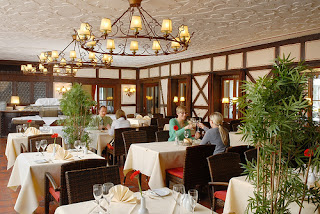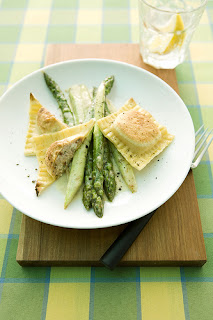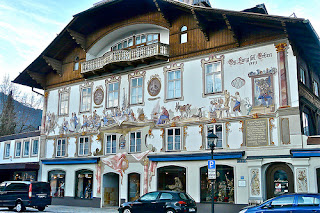 |
| Image of a German restaurant by relexa hotels, via Flickr.com |
Any number of young German women who applied for non-immigrant visas to travel to the U.S., for example, were studying Gastfreundschaft, hospitality, in order to move into positions as Gastfreundschaft-Arbeiterinen, the feminine plural of hospitality worker. I didn't get the impression that any of them would have ever described their chosen career as being just a waitress or just a reception desk clerk, as I felt my time working in an office to be just a secretary. They would start out in those entry level positions, with no complaining or grumbling. They had their eyes on something bigger and better down the road. And it was understandable that those studying the field of hospitality would want to experience how guests in other countries were treated, likely the reason that so many of them wanted to travel to the U.S.
To test out my theory that all Germans took greater pride in their work than I thought Americans did, I decided I would dedicate my time in Germany to the search for a bad restaurant, one that exhibited poor service or poor food quality or even the ultimate - bad food and bad service.
There were plenty of restaurants in Stuttgart including a Hungarian restaurant, just across the street from the consulate, that served the most delicious goulash I have ever had. There was a magnificent Chinese restaurant that we got approval from the boss so that all of us in the visa section could go there together for a late lunch to celebrate someone's birthday or farewell. In that restaurant, I met lychee fruit. They served lychee fruit over vanilla ice cream for dessert which I don't recall ordering - I think it was the restaurant's thank you to us for bringing in such a large group for lunch. There was an Afghan restaurant where we would now and then run into some of our Farsi translators. Even the likelihood of being approached by pesky translators wanting to intervene on behalf of their Iranian visa applicant clients wasn't enough to keep us away from the restaurant because the food was so good.
 |
| Image of Maultaschen with asparagus by Butaris, via Flickr.com |
One evening when three of my colleagues from German language days came down to Stuttgart from Bonn, a group from the consulate joined us and we all went out to one of my favorite German restaurants. It was at that point that I realized how different the menu choices were in southern Germany than they were in northern Germany. Since all three of them had spent most of six months in German language classes with me, I knew that their German language skills were at least on par with mine, but they all seemed unfamiliar with the menu options. Or maybe the restaurants in Bonn had English translations for everything like I saw in Frankfurt. Stuttgart wasn't that Americanized.
Michael mentioned that the only food he really didn't like was liver which he knew was Leber in German so he picked something he knew wasn't liver. Janice then mentioned that the only food she couldn't eat was kidneys. She picked something with chicken. I probably had Maultaschen, something light and full of flavor that would leave room for dessert.
When the meals came, the conversation continued, but Michael was unexpectedly quiet, clearly not enjoying his meal. Janice asked him what was wrong and he said his meal was liver, in spite of the fact that there was no reference to Leber in the name. Janice offered to switch meals with him because she liked liver. It was a generous gesture which Michael accepted. Then it was Janice's turn to become quiet. As the rest of us continued to eat and converse, Janice sat quite still until the waitress came by and she asked if she could see the menu again. When the waitress returned with the menu, Janice brought it to me to ask if I knew what the item Michael ordered was. The word, Niere, wasn't familiar to her. And while it wasn't in my active vocabulary, I did understand it because I learned it by association - it is an anagram of reine, which means cleans. And that is precisely what the kidneys do - they remove wastes from blood. It turns out there are two foods Michael didn't like - liver and kidneys - and he couldn't tell the difference.
By this time, the rest of us had already tucked away enough of our meals that there wasn't really much of an option for one of us to make the same offer as Janice had to trade meals. But this wasn't a problem. The waitress noticed that Janice wasn't eating her meal, so she offered to bring her something else at no charge. What had started out looking like it might just be an example of a less than excellent restaurant turned out instead to be yet another example of an excellent restaurant. The food wasn't bad - it just wasn't what Michael or Janice had thought it was.
But I didn't just try out restaurants in Stuttgart. I traveled to Bonn to visit Janice and Michael. I traveled to Berlin where I visited a couple I had met in St. Paul, he German and she Romanian. I traveled to Munich to take part in the real Oktoberfest. I traveled throughout much of Baden-Wurtenberg with my friends Jan and Kathy who were in Germany on business. And I traveled in both Baden-Wurtenberg and Bavaria with my parents. In all of those places I eagerly tested my theory that there are no bad restaurants in Germany. No matter how hard I tried, I just couldn't find one.
 |
| Image of Oberammergau by Rita Willaert, via Flickr.com |
I didn't stop looking for a bad restaurant in Germany once I found a mediocre one. But my search was a failure - except for all the good food and all the great hospitality I was shown during my ventures.
No comments:
Post a Comment